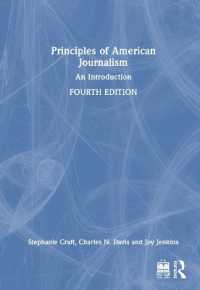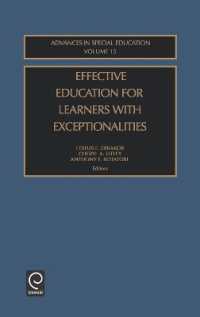Full Description
The rapid development of video technology in the last decade has changed the ways in which people communicate, how they learn, and how research is done. Video technology offers rich potential in capturing complex social interactions over a prolonged period of time and in supporting teacher professional learning and development.
This book explores the ontological, epistemological, methodological, and ethical challenges associated with the different uses of video in research, ranging from video as a tool for investigating social interactions and for stimulating participants' reflection, to the use of video for engaging varied communities and social groups in the process of teaching, learning and research. Each chapter presents the authors' critical reflection on the ways in which video was employed, the research decisions made, the methodological challenges faced, and the consequences for how educational practices were understood. As such, it illustrates a wide range of philosophical and theoretical standpoints with respect to video-based research approaches.
This book will stimulate broad and rich discussion among education researchers who are interested in video research and contributes to: advancing knowledge of the field; developing approaches to dealing with emergent ethical, theoretical, and methodological issues; and generating new protocols and guidelines for conducting video-based research across a variety of disciplinary areas in education.
Contents
List of Figures and Tables
Introduction
Section I: The Roles of Video in Education Research
Section Overview Wanty Widjaja, Gaye Williams, and David Clarke
1. The Use of Video in Classroom Research: Window, Lens, or Mirror David Clarke and Man Ching Esther Chan
2. Validity and Comparability in Cross-cultural Video Studies of Classrooms Lihua Xu and David Clarke
3. A Video Study of Quality Teaching and Learning in Three Countries Russell Tytler, Hsian-Lan Sharon Chen, Mark Hackling, and Jörg Ramseger
4. Potential and Challenges in Examining Teachers' Metacognitive Instructional Strategies Using Video Technology Lee Ngan Hoe, Ng Kit Ee Dawn, Cynthia Seto, and Loh Mei Yoke
5. Examining Primary School Teachers' Professional Noticing Through a Video-Based Methodology Wanty Widjaja, Lihua Xu, and Wendy Jobling
6. Critical Videographic Research Methods: Researching Teacher's Lives and Work Post '9/11' Matthew Krehl Edward Thomas and Julianne Moss
Section II: Video as a Tool for Capturing and Understanding Complexity of Teaching and Learning
Section Overview Lihua Xu, Russell Tytler, and Louise Paatsch
7. Video-Based Research in a Laboratory Classroom: Connecting Learning to Classroom Interactions Man Ching Esther Chan and David Clarke
8. Video Research: Purposeful Selection From Rich Data Sets Joseph Ferguson, George Aranda, Russell Tytler, and Radhika Gorur
9. The Use of Video-based Ethnography in an Inquiry-based Blended Science Classroom Connie Cirkony and Peter Hubber
10. Characterisation of the Didactic Contract Using the Video of the Classroom as Primary Data Andrée Tiberghien and Patrice Venturini
11. The Use of Recurrent Gestures to Give Cohesion to Classroom Discourse Eduardo F. Mortimer, Renata Reis Pereira, and Luciana Moro
12. Re/active Documentary: An Artefact of Dynamic Force Melissa Joy Wolfe
Section III: Video as a Tool for Reflection on Practice in Teaching and Learning
Section Overview George Aranda, Linda Hobbs, and John Cripps-Clark
13. Using Video-Stimulated Interviews to Foster Reflection, Agency and Knowledge-Building in Research Maria Nicholas, Louise Paatsch, and Andrea Nolan
14. Video as a Second Stimulus in Developing the Professional Agency of Primary Pre-service Teachers John Cripps Clark, Gail Chittleborough, and Paul Chandler
15. Using Self-captured Video to Support Reflective Practice in Teacher Professional Learning Communities Peter Hubber, Peta White, and Amanda Berry
16. Preparing Teachers for Reform-oriented Teaching Using the Thematic Approach of Re-viewing Videos Valerie Wing Yan Yip, Kennedy Kam Ho Chan, Benny Hin Wai Yung, and Ching Lai
List of contributors
Index







